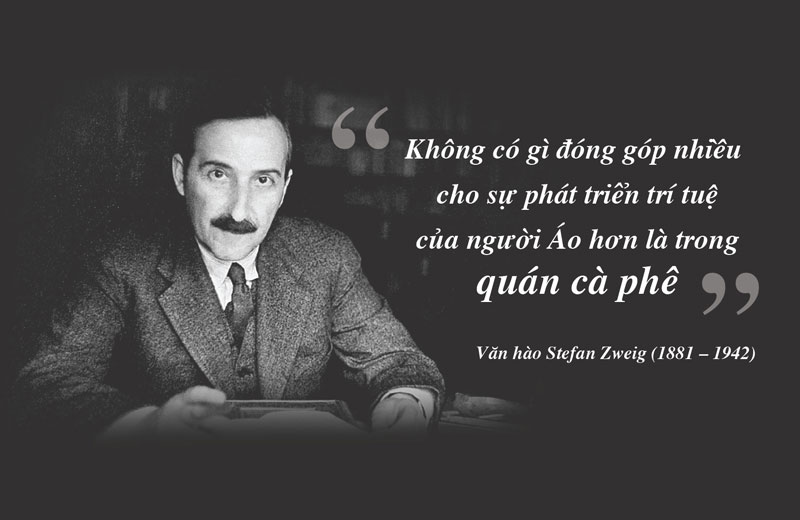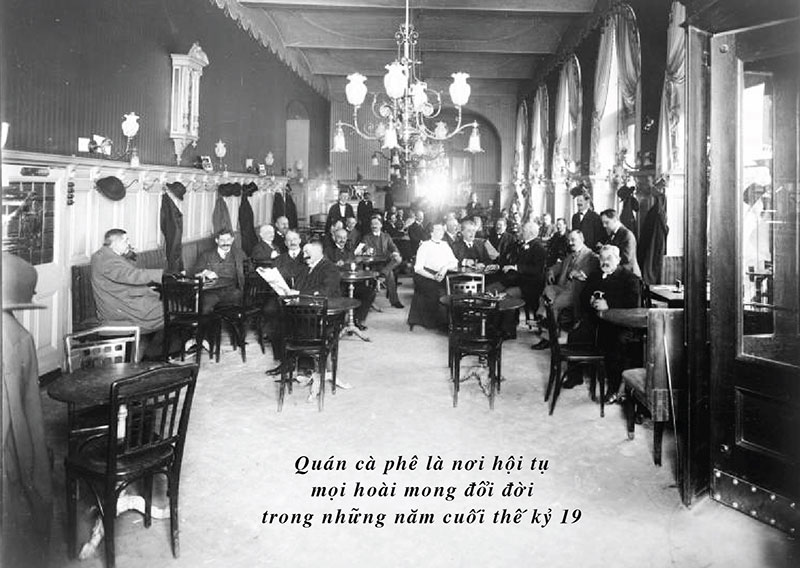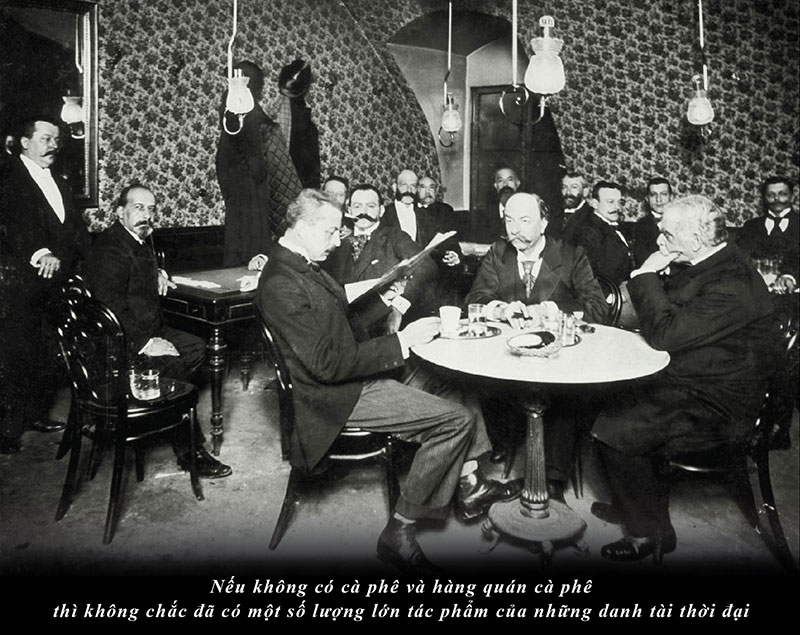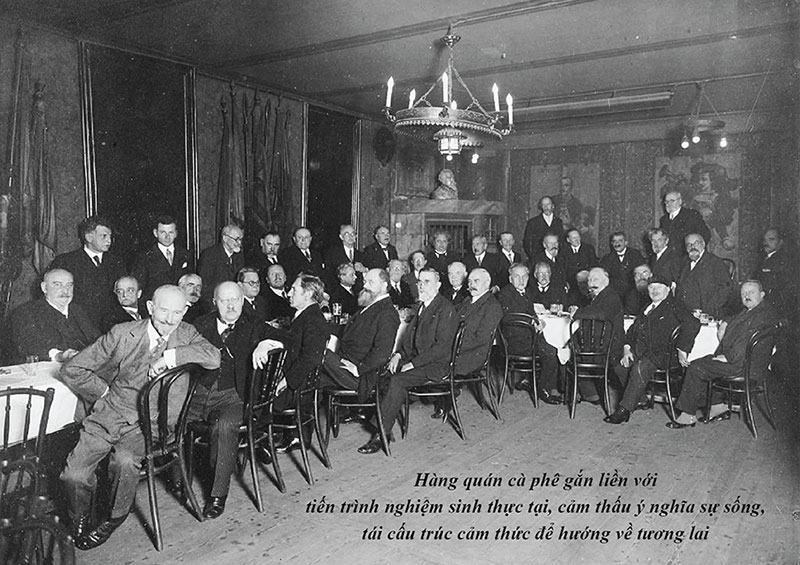Article 36: Literary cafe in the process of restructuring modern thought
The atmosphere of Viennese coffee culture promoted people to realize themselves in the existential process, to master their minds to understand the reason for existence.

“Nothing contributes more to the intellectual development of Austrians than in a coffee shop” – Stefan Zweig (1881 – 1942)
The characteristic of Vienna in the late 19th century was collision. Cultural collision between peoples and countries when the Austro-Hungarian monarchy dominated the second largest territory in Europe. The collision of ideas between Naturalism, Romanticism, Realism, Expressionism… Collisions of pre-modern, modern and anti-modern beliefs coexisted in parallel. That pluralistic society was the living material that stimulated people to experience reality in order to look forward to the future. Since then, a class of intellectuals had received the mission of restructuring their thoughts in the direction of promoting a new life.
The process of new ideological restructuring in the tense context of collision was cleared by conversations in cafes. Not only debating current issues, searching for the common right among countless differences, the coffee shop was also a place for self-assessment to understand the meaning of existence. That coffee culture atmosphere fueled the desire to express the style, while at the same time affirming the cultural spirit of the beholder. This was also one of the reasons that formed the Viennese literary era, which had a global influence throughout the late 19th to 20th centuries.

The coffee shop was the convergence of all life-changing desires in the late 19th century
In 1891, at Café Griensteidl, the literary group Jung-Wien (Young Vienna) was founded. Jung-Wien writers such as Hermann Bahr, Hugo von Hofmannsthal, Arthur Schnitzler, Peter Altenberg, Felix Salten… from the overlap in styles came together to develop modern literature. The works of the Jung-Wien group published in the magazines Moderne Dichtung (1890), Moderne Rundschau (1891), Die Zeit (1894) made significant influences on contemporary ideology.
Café Central would always have 250 newspapers in 22 languages, where famous works of the era originated. The playwright Arthur Schnitzler clarified the state of mind of the Viennese bourgeois society through his works “Lonely Road” (1896), “Big Country” (1911). The author Peter Altenberg was originally a businessman, studied medicine, and laws but eventually became a famous Viennese Modernist writer with works that purely observed the events taking place in the Café Central.
After World War I, Café Herrenhof was the place where writers Hermann Broch, Robert Musil, Franz Werfel, Leo Perutz, Joseph Roth, Otto Soyka, Alfred Polgar… chose to live and work. In the 1950s, Café Hawelka was one of the most important meeting places for the Viennese art world. This was also where the group of writers and poets Wiener Gruppe researched the nature of linguistic meaning and promoted Baroque literature as well as Expressionism, Dadaism, Surrealism…

Without coffee and cafes, it is unlikely that there would be a large number of works by the great talents of the era
In addition to Café Griensteidl, Café Central, Café Herrenhof, and Café Hawelka, which were called “loyal meeting places” of the literary world, other coffee shops such as Café Imperial, Café Schwarzenberg, Café Prückel, Café Korb, etc. played a great role in literary life, creating the glorious Austrian literary era. The type of literary café influenced even major contemporary cities, from Budapest (Café Abbazia) to Pressburg (Café Continental), Prague (Café Arco)… making Viennese coffee culture famous for the term ” Kaffeehausliteratur”, understood as the whole or part of a literary work that was completed in the cafe.
The space of the coffee shop – the place to transform the consciousness of the times has been confirmed in many literary works such as “The coffee house as will and concept” – Hans Weigel, “That’s how I became” – Peter Altenberg, “The coffee house as an educational institution” – Stefan Zweig, “Coffee house culture” – Ludwig Hirschfeld, “Zeitgeist in the literature café” – Anton Kuh, “About Adolf Loos. Career in Café Central” – Oskar Kokoschka,…
In his work “The World of Yesterday”, writer Stefan Zweig describes the academic atmosphere in the cafe: “The Viennese café is a particular institution which is not camparable to any other in the world. It is a sort of democratic club to which admission costs the small price of a cup of coffee. Upon payment guest can sit for hours on end, discuss, write, can go through an unlimited number of newspapers and magazines. And so we knew everything that took place in the world at first hand, we learned about every book that was published, and every production no matter where it occurred, and we compared the notices in every newspaper. Perhaps nothing has contributed as much to the intellectual mobility of the Autrian as that in the café.”

Coffee shops were associated with the process of experiencing reality, understanding the meaning of life, restructuring the senses to look to the future.
The coffee shop’s role in shaping the ideology in the context of cultural collisions has shown the desire to affirm its existence, to have each person’s life philosophy discourse interwoven in the coffee atmosphere where the desires of the times are present. This has made the space of the cafe, whether you want it or not, to be associated with the process of experiencing reality, understanding the meaning of life, restructuring the senses to look to the future.
THE REAL COFFEE
ROASTED ONLY FOR PEOPLE OF WISDOM!
Source: “The Philosophical Way of Coffee” – copyright by Trung Nguyen Legend


